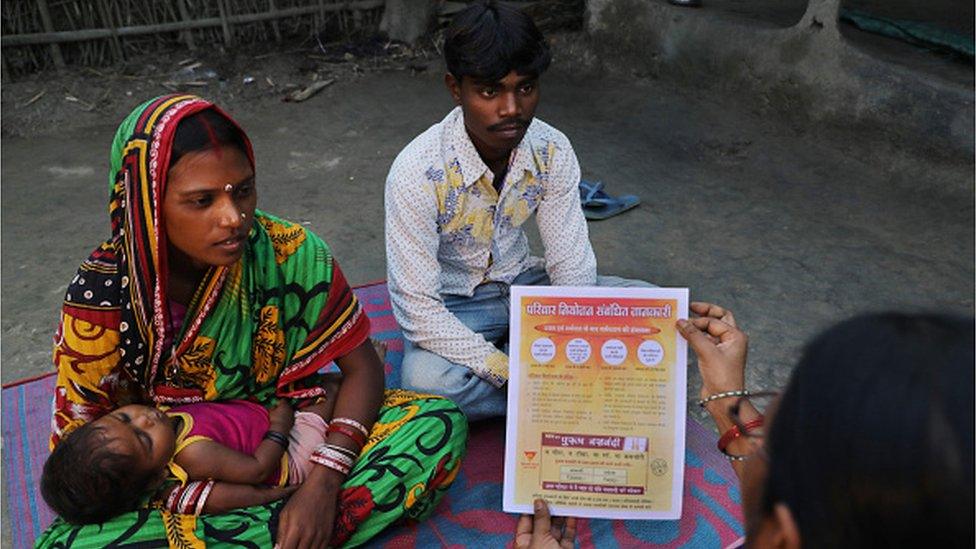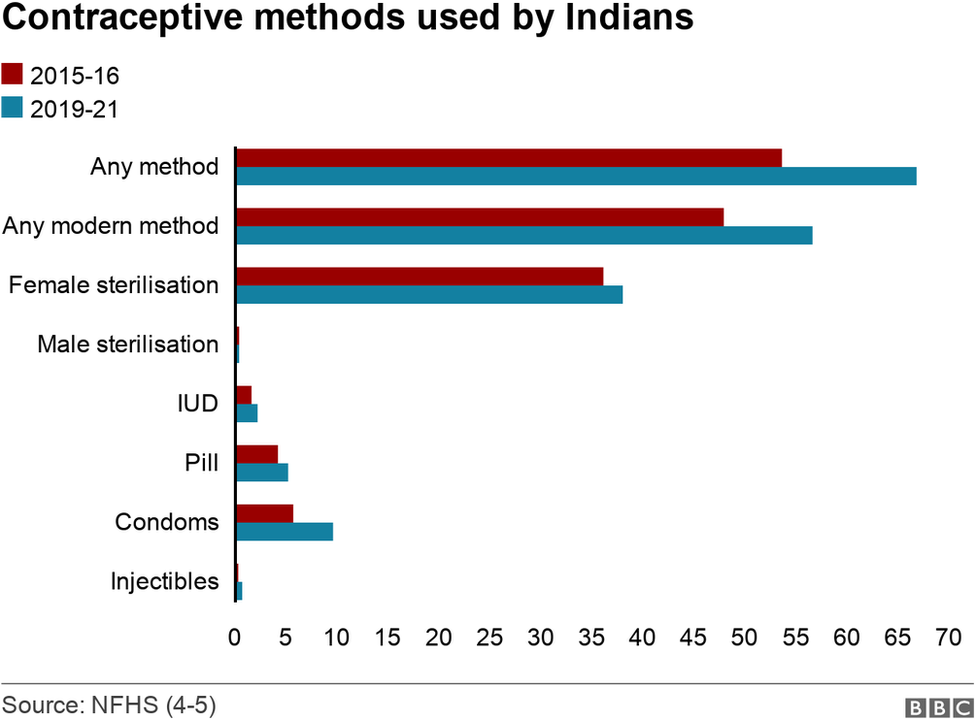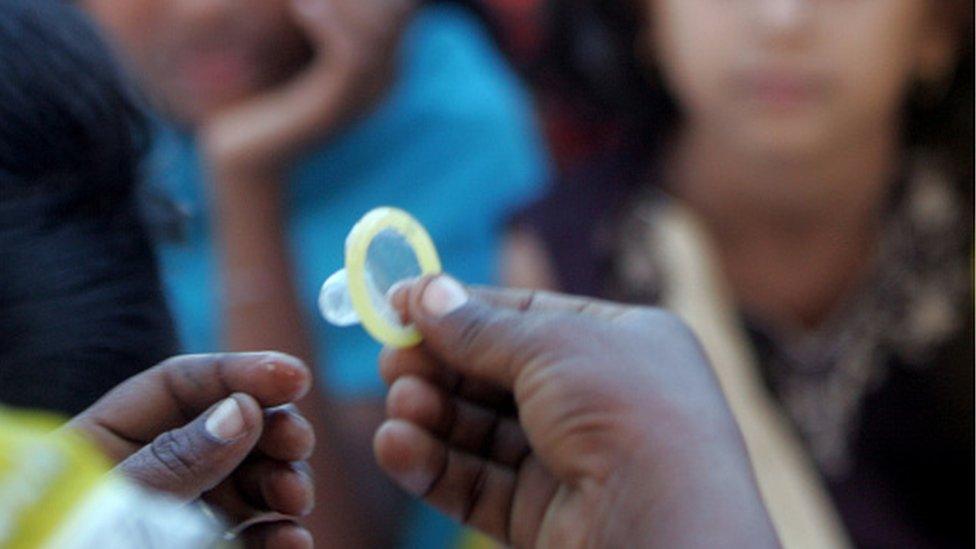NFHS-5: Why birth control remains a woman’s burden in India
- Published

Few men in India participate in family planning programmes
When Ranjani Sharma told her husband that she was considering sterilisation, he initially tried to dissuade her.
"He said it may impact your health adversely," the 27-year-old mother-of-three told me on the phone from her home on the outskirts of the northern Indian city of Lucknow.
But, Ms Sharma said she was fed up. The couple had decided they didn't want any more children and had been using condoms to avoid pregnancy. But it was not a "foolproof method" and when she conceived - twice - she took over-the-counter abortion pills.
"I had heavy bleeding, my head would spin, I had blackouts and I was listless and tired all the time. So I told him that sterilisation would be better than taking these blighted pills," she said.
The couple considered whether it was her husband who should instead get the procedure done.
"But I told him no," Ms Sharma said. "He's the family breadwinner and sterilisation will make him weak, he won't be able to do heavy lifting."
Dr S Shantha Kumari, president of the Federation of Obstetric and Gynaecological Societies of India, says it's "myths and misconceptions" like these that male sterilisation or vasectomy will impact virility is what prevents men from participating in family planning programmes, leaving the burden of contraception entirely to women.
"India's family planning campaigns, run by the government and non-governmental organisations, are also completely focussed on women. I believe it should be the responsibility of both men and women, that they should be partners in this decision. But the onus is always on women," she says.
The claim is borne out by the latest National Family Health Survey (NFHS-5), the most comprehensive household survey of health and social indicators by the government, conducted between 2019-2021.
The survey reveals that more than 99% of married men and women between the ages of 15 and 49 know about at least one modern method of contraception - which includes male and female sterilisation, condoms, pills, injectables and intrauterine devices - and that their usage has increased from 47.8% to 56.5% between 2015-16 and 2019-21.
But that's where the silver lining ends.


With fewer than one in 10 men - 9.5% - using condoms, female sterilisation remains the most popular method of contraception and has even risen from 36% to 37.9% in the past five years. Male sterilisation, even though it's safer and easier, remains unchanged at 0.3%.
The survey also saw 50% of men in Uttar Pradesh, Bihar and Telangana states saying that "contraception is women's business and a man should not have to worry about it". One in three men in Andhra Pradesh, Madhya Pradesh and West Bengal and 45% of men in Karnataka expressed similar views.
For things to really change, it's this attitude that needs to change first, says Abhinav Pandey, who led a research project from 2017-2019 in five states - Uttar Pradesh, Bihar, Madhya Pradesh, Chhattisgarh and Rajasthan - on the unequal burden of family planning methods on women.
"In all the states we found that male engagement in family planning programmes was very low, mainly due to a lack of awareness," Mr Pandey says.
"There are lots of misconceptions about sterilisation, men feel that they would lose their masculinity and will not be able to work in jobs that involve hard labour. Condoms are more acceptable, but a lot of men told us they didn't like them because they were uncomfortable and made sex less pleasurable."
In villages and among urban poor, government workers distribute free condoms as part of the family planning programme and as protection from sexually transmitted diseases.
But, Akansha Yadav of the GB Pant Institute of Studies in Rural Development, who trains rural health workers and village council members in safe abortion practices, says that many women get pregnant if a condom is faulty or not used correctly or when their husbands come home drunk at night and refuse to use protection.
And then it becomes a woman's headache. With few women aware that abortions are legal in India, Ms Yadav says, women turn to over-the-counter abortion pills or permanent sterilisation - like Ranjani Sharma did.

Campaigners say a lot of men say they don't like using condoms because they make sex less pleasurable
Dr Kumari says in the first instance, she advocates only long-term reversible contraception, not permanent sterilisation.
"Once a couple has had two children, I tell them to go for a temporary but long-term sterilisation and a few years later, they can decide whether they want to go for permanent sterilisation."
For women, she says, long-term contraception comes in the form of intrauterine devices or pills, but there is nothing similar available for men.
"There is research going on across the world to find long-term reversible contraception for men, but there is nothing in the basket at the moment."
Mr Pandey says until that happens, family planning programmes must find ways to reach out to men. But don't expect a miracle, he warns, because the change will be slow.
"Men are not comfortable talking about sex in open forums. In rural areas, government health workers are almost all females who deliver condoms to people's homes but they have little access to men. So we have suggested that that the government recruit male volunteers to mobilise men to increase their participation in family planning."
In 2016, he says, a pilot project was rolled out in 148 districts across India where mothers-in-law and daughters-in-law were called to talk about family planning. In 2019, Rajasthan started calling husbands to these meetings and a year later it was introduced in Uttar Pradesh.
"This helped improve male engagement to some extent. We saw that some men started accompanying their wives for counselling sessions, but they were still reluctant to use contraception."
For that to change, Dr Kumari says, the government, doctors and the media need to join hands for a campaign that will convince young men that vasectomy is safe and simple. Until that happens, she says, men will continue to shirk the responsibility of family planning and the burden of contraception will remain a woman's.
Graphic by the BBC's Shadab Nazmi

Read more on India's family survey from the BBC:
